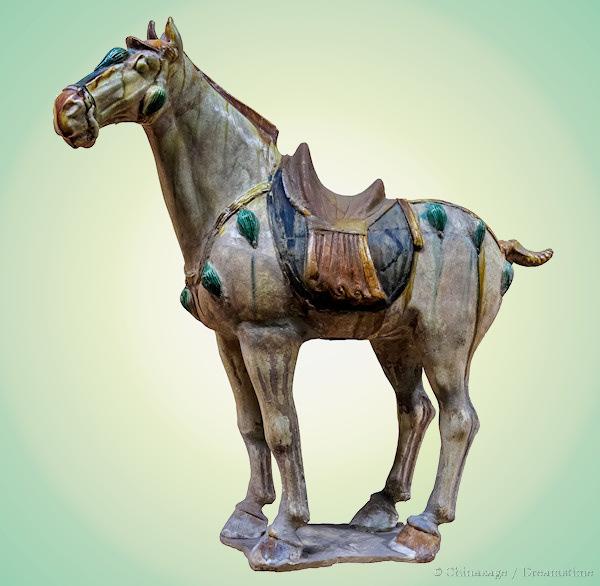Chinese History 历 史
Most countries can look back at a few hundred years of continuous recorded history; China looks back at thousands of years. From earliest times an accurate account of events has been treasured by the Chinese, this is embodied in the character 史 history ’ which also has the meaning ‘impartial’ . Chinese people know their heritage well and have a long tradition of revering their ancestors . A good knowledge of Chinese history is essential to understanding and relating to its people.
We include pages on all the main dynasties (click on time chart) as well as significant events in Chinese history, up to the foundation of the Republic separate section Taiping Rebellion railways Imperial system Hanlin Academy Imperial officials kowtow Mandate of Heaven Opium Wars Early contacts with Britain 18th century UK-China contacts Leibniz Treaty port system Chinoiserie Lay-Osborn debacle General Charles ‘Chinese’ Gordon Chinese coolies
Click on the time chart on the left to go to a particular time period.
Chinese money As in so many other things, China was the first to introduce paper currency and has had a standard coinage for thousands of years. Read more…
Yuan or Mongol dynasty The great Mongol hordes took northern China in 1215 but the south held out until 1279. Kublai khan established the capital of the Great Khan at Dadu, present day Beijing . Their brief period of rule (90 years) saw the Mongols take to Chinese ways, using existing administration and traditions rather than imposing their own. It was China's most cosmopolitan era with the famous visit of Marco Polo . Read more…
General 'Chinese' Gordon In a very unusual event in world history a British soldier served for the Qing dynasty in their fight against the Taiping rebels in southern China. He was instrumental in bringing modern military training to the Chinese army and was renowned as an austere but brave and uncorruptible officer. Read more…
Shanghai
Shanghai City was known as the 'Paris of the East' in the 1920s. By Chinese standards Shanghai is a very modern city. It was just a small fishing port in the 1840s with population of only 50,000; by 2007 this had risen to an incredible 24 million (2016) making it the largest city in China. It is considered China's second city. Read more…
Ancient stone writings Stone steles form the most permanent of records. Over the centuries they have been used as memorials, reference libraries, calligraphy samples and poems. Visitors to China will have seen these revered inscriptions in all sorts of locations: mountains, houses, parks and museums documenting the lives and feelings of people over the centuries. They are a powerful and permanent expression of the continuity of Chinese history. Read more…
Chinese porcelain Together with tea and silk, porcelain from China is its most famous export. Prized the world over, high quality porcelain commands high prices at auction. Like silk the secret of its manufacture was a closely guarded secret for centuries. Read more…
Song dynasty The Song dynasty is a period of Chinese refinement and peace rather than military prowess. Great strides were taken in the creative arts and literature. Prosperity from the growing trade by sea rather than overland fueled the building of huge cities. The eventual conquest by the Mongol hordes brought the dynasty to a tragic close. Read more…
The Chinese Stars The Chinese system of astronomical observation is as ancient and distinctly different that as that developed in Europe and the Middle East. More emphasis was put on the moon than the sun and stars were arranged into groups according to the layout of the Imperial court. Read more…
Japan and China The history of the often difficult relations between China and Japan reveals a complex relationship. The Japanese occupation of China 1937-45 and continued U.S. support for Japan has led to continuing frictions between governments and peoples. Read more…
The early history of China from pre-history to 770BCE Most of the ancient traditions of China had become established 3,000 years ago. The institution of Emperor, the written scripts and the key technologies (including silk) all come from China's distant past. The longevity and continuity of Chinese culture are the two key principles to understanding China - even today. Read more…
The 13 Ming Tombs The tombs of the 13 Ming Emperors is one of the largest and most lavish burial complexes anywhere in the world. Like the Valley of the Kings in Egypt the tombs are scattered around a valley of 17 square miles but here only one tomb has been excavated and was found to be completely intact. Read more…
The building of China's railways The building of railways became a competitive scramble in the late 19th and early 20th century. Railways were seen as the key step to opening up inland China for trade. Britain, France, Germany, Japan and America all invested heavily in railway construction only for the the money to be lost in the following years of turmoil. Read more…
The governance of modern China Governing 1,400 million people is no mean feat. China's structure of government is a power pyramid with the President at its head. In theory the people elect representatives who decide policy, in practice the ruling elite are rarely challenged by the democratic process. However the strong military involvement in government has been on the wane for over 25 years. Read more…
Game of Go or Weiqi The ancient game of 'Go' is called 围棋 wéi qí in China. It was a Chinese invention and has for centuries been the top game for learning strategy. Scholars would spend hours honing their skills to outwit an opponent with a disarmingly simple set of rules. Read more…


